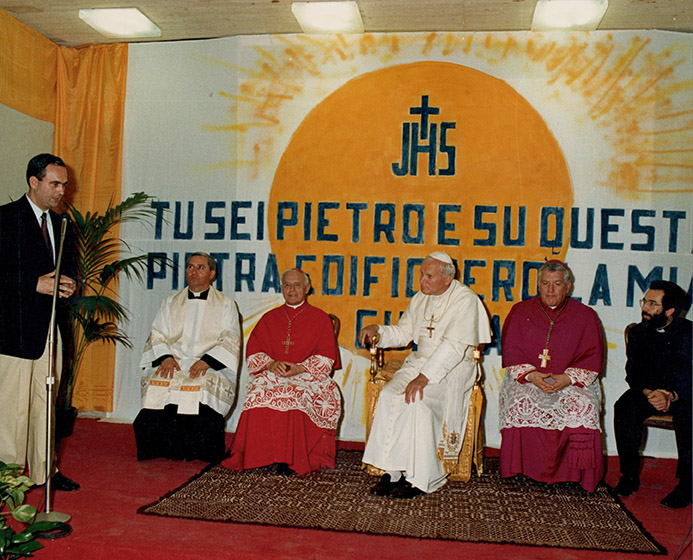Visit to the parish of San Remigio de Colleverde 6-9-1990
St. John Paul II
Rome, June 9, 1990 *
In the parish auditorium, they were Neocatechumenal Communities gathered with the usual choir of their very many children. The songs and the “advances” of the children to the Holy Father, who, among other things, has always showed great affection to the little ones. Massimo, catechist of the parish, has presented to the Holy Father the reality of the Neocatechumenal Communities in the parish.

The Holy Father answered thus:
“Baptism as it is offered today to children is an experience that belongs more than anything to the family, but to live this experience in return is required. This return is the one that the Neocatechumenal Communities promote. They say to everyone, ‘You are a Christian, you need to go back to your Baptism, you need to be prepared once more for the Baptism you have received. You need to become a catechumen, and you need, with this catechumenate, to arrive at the experience of baptism that the first Christians had, that St Paul had’. St Paul’s words about Baptism are stupendous. Before everything else the Christian experience is the experience of Baptism which is what takes us towards all the sacraments, but above all towards the Eucharist.
In the practice of the Christian life in the parish the Eucharist is the sacrament that is most lived and it is an experience that is lived also with the children who are preparing for First Communion. There is a preparation, there is a deepening, there is a sense of what the Eucharist is, in the species of bread and wine, of what Christ has left us as Eucharist: himself, as gift, as food. Certainly, the Christian experience is above all the eucharistic experience and if it begins with the experience of Baptism the latter brings us to the eucharistic experience.
Experience is necessary. We can receive the sacraments without living them, without entering into the depth of the mystery that is being celebrated. There needs to be this experience, the experiential aspect of the Christian life and I am very grateful to all these movements that arc causing the Christian experience and the different aspects of the Christian life of a baptized person to grow and be plentiful, that take people to the depths of the Christian life. In this way man becomes more open to God, understands what is in and out of proportion, understands what radical conversion is, understands what sin is, what it means to be justified by grace, what is the abyss of mercy, of love, of the Trinity, of the gift of God. In all these experiences based on the sacraments there is always the experience of prayer. Prayer too can be a ritual, without any deep experience, superficial, that stays on the surface of our thoughts, our commitment, our personality. But if with prayer we enter more deeply into communion with God, prayer itself becomes abundant, something splendid, extraordinary. Our prayers need to become deeper, need to be alive. There needs to be an experience so that what prayer is, what it is meant to be, what God is offering to us through prayer, is not lost.
I thank God that there are the experience in your parish, experiences that carry out what is essential for the life of tile parish, for the parish is not just an administrative structure, but it is life, participation in the divine life, participation, through Christ and the Holy Spirit, in the life of the Trinity.”
(*) Cfr. «L’Osservatore Romano», 15-16 June 1990.